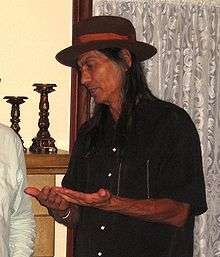Richard Ray Whitman
Richard Ray Whitman (born 1949) is a Yuchi-Muscogee Creek multidisciplinary visual artist, poet, and actor. He is enrolled in the Muscogee Creek Nation and lives in Oklahoma.[1][2]
Richard Ray Whitman | |
|---|---|
 Richard Ray Whitman, 2010 | |
| Born | T'so-ya-ha May 14, 1949 |
| Nationality | Yuchi-Muscogee (Creek) Nation |
| Education | Institute of American Indian Arts, California Institute for the Arts, Oklahoma School of Photography |
| Known for | Photography, mixed-media, film, painting |
Notable work | Street Chiefs |
Background
Richard Ray Whitman was born in Claremore, Oklahoma on 14 May 1949.[3] His maternal grandmother was Polly Long.[1] Like many Yuchis, Whitman is enrolled in the Muscogee (Creek) Nation, and his Yuchi name is T'so-ya-ha.[4] He grew up in Gypsy, Oklahoma and attended Bristow High School. For college, he attended the Institute of American Indian Arts and the California Institute of the Arts. Whitman also studied at the Oklahoma School of Photography in Oklahoma City.[1]
Whitman began his art career as a painter but also expanded to photography, installation, and video art.[4] In 1973, he participated in the occupation of Wounded Knee[3] and created art during the struggle.[1]
Photography
Whitman is known for his black-and-white photography portraying contemporary Native realities, especially his "Street Chiefs Series" from the 1970s and 1980s. "Street Chiefs" features images of homeless Native men, primarily in downtown Oklahoma City. "The contemporary Indian in the isolation of the city canyons and rural reservations is avoided. The boredom, pain, frustration, poverty of the reality-counterbalance of our lives is harsh, unattractive, and unmarketable."[2] His photographic portraits are compassionate and empathetic to the lives of homeless natives and places them in the larger context of Indian Removal, which forced tribes from all over the country to Indian Territory.[4]
From the 1980s onward, Whitman has incorporated text and computer graphics in his photography to create collage or mixed media. His socio-politically informed work often deals with the issues of homeland and dispossession.[4]
Videography and acting career
Collaborating with Yuchi poet and brother Joe Dale Tate Nevaquaya, Whitman created video to document the Yuchi language. Together they worked with French filmmaker Pierre Lobstein in the 1990s. Whitman read T.C. Cannon's poetry in the video "Mazerunner: The Life and Art of T.C. Cannon" which was directed and edited by Phillip Albert. This work was subsequently screened at the Metropolitan Museum of Art (3/19/1994) and was presented on the Bravo Cable Channel and the Independent Film Channel from May, 1995 through June, 1996.
Filmography
- "Neither Dog Nor Wolf" (2016). Played Grover.[5]
- "Barking Water" (2009). Played Frankie.[5]Richard Ray Whitman. The Internet Movie Database. (retrieved 25 August 2009)</ref>
- "The Only Good Indian" (2009). Played father of stolen child[5]
- "Missionary Man" (2007). Played Chief Dan[5]
- "Four Sheets to the Wind" (2007). Directed by Sterlin Harjo, Whitman played Frankie Smallhill
- "Rune" (2006). Played Tecpatel[5]
- "American Indian Graffiti: This Thing Life" (2003). Played Barry[5]
- "Lakota Woman: Siege at Wounded Knee" (1994). Played Carter Camp.[5]
- "The Grand Circle" (1994). Co-produced with Joe Dale Tate Nevaquaya and Pierre Lobstein
- "Mazerunner: The Life and Art of T.C. Cannon" (1993). Directed and edited by Phillip Albert; T.C. Cannon poetry read by Richard Ray Whitman.
- "Humanity's Voice" (1992). Co-produced with Joe Dale Tate Nevaquaya and Pierre Lobstein
- "Carriers of the Light" (1990). Co-produced with Joe Dale Tate Nevaquaya and Pierre Lobstein
- "War Party" (1988). Played Harold, directed by Franc Roddam[5]
Quotes
- We're invisible, dangerously invisible, until they want us to sing and dance and be tourist attractions.[4]
- ...I am asked many times..., "do I consider myself a traditional Indian or a contemporary Indian?" Well, I consider myself both at the same moment. Our traditions and our experiences in contemporary life are here at the present time. Our ancestors left us a way which has been brought right up to this moment, to this very moment that I speak to you. So, from the time we are born we are political. Because we have been colonized, the nature of our experience is political, but it doesn't lessen our experience, though.[4]
Notes
- Lester, 619
- Lippard, 216
- Vigil, Jennifer C. "Richard Ray Whitman." Museum of Contemporary Native Arts: Vision Project." (retrieved 10 May 2011)
- Abbott, Larry. Richard Ray Whitman, Yuchi. A Time of Visions. (retrieved 25 August 2009)
- The Internet Movie Database. (retrieved 1 October 2016)
References
- Lester, Patrick D. The Biographical Directory of Native American Painters. Norman: Oklahoma University Press, 1995. ISBN 0-8061-9936-9.
- Lippard, Lucy. Mixed Blessings: New Art in a Multicultural America. New York: The New Press, 2000. ISBN 1-56584-573-0.